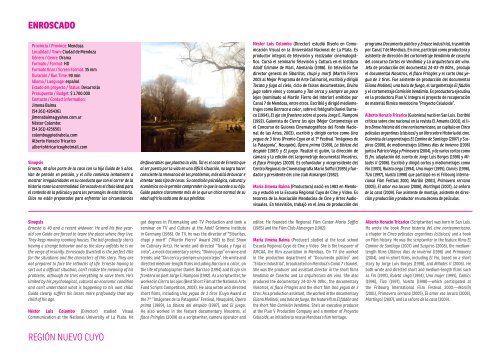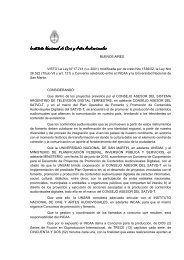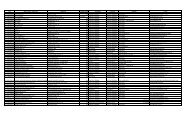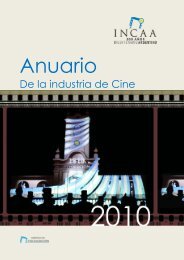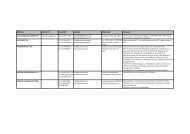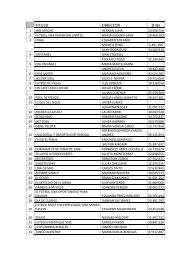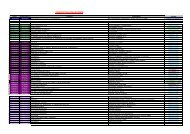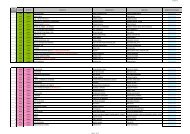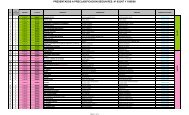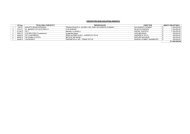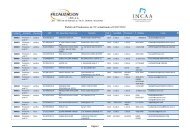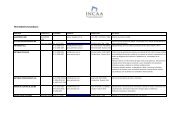Catálogo de proyeCtos seleCCionados 2009 - Incaa
Catálogo de proyeCtos seleCCionados 2009 - Incaa
Catálogo de proyeCtos seleCCionados 2009 - Incaa
Create successful ePaper yourself
Turn your PDF publications into a flip-book with our unique Google optimized e-Paper software.
ENROSCADO<br />
Provincia / Province: Mendoza<br />
Localidad / Town: Ciudad <strong>de</strong> Mendoza<br />
Género / Genre: Drama<br />
Formato / Format: HD<br />
Formato final / Screen Format: 35 mm<br />
Duración / Run Time: 90 min<br />
Idioma / Language: español<br />
Estado <strong>de</strong>l proyecto / Status: Desarrollo<br />
Presupuesto / Budget: $ 1.700.000<br />
Contacto / Contact information:<br />
Jimena Baima<br />
(54 261) 4264361<br />
jimenabaima@yahoo.com.ar<br />
Néstor Colombo:<br />
(54 261) 4256561<br />
colombo@piedrabola.com<br />
Alberto Horacio Tricarico<br />
albertohtricarico@hotmail.com<br />
Sinopsis<br />
Ernesto, 40 años parte <strong>de</strong> la casa con su hijo Guido <strong>de</strong> 5 años.<br />
Van <strong>de</strong> pensión en pensión, y el niño comienza lentamente a<br />
mostrar irregularida<strong>de</strong>s en su conducta que con el correr <strong>de</strong> la<br />
historia rozan la anormalidad. Enroscado es el título i<strong>de</strong>al para<br />
el contexto <strong>de</strong> la película y para los personajes <strong>de</strong> esta historia.<br />
Ellos no están preparados para enfrentar las circunstancias<br />
<strong>de</strong>sfavorables que plantea la vida. Tal es el caso <strong>de</strong> Ernesto que<br />
al ser puesto por la vida en una difícil situación, no logra hacer<br />
consciente la relevancia <strong>de</strong> los problemas, más allá <strong>de</strong> buscar e<br />
intentar todo tipo <strong>de</strong> cosas. Su condición psicológica, cultural y<br />
económica no le permite compren<strong>de</strong>r lo que le suce<strong>de</strong> a su hijo.<br />
Guido pa<strong>de</strong>ce claramente más <strong>de</strong> lo que un chico normal <strong>de</strong> su<br />
edad sufriría cada una <strong>de</strong> sus pérdidas.<br />
Néstor Luis Colombo (Director) estudió Diseño en Comunicación<br />
Visual en la Universidad Nacional <strong>de</strong> La Plata. Es<br />
productor integral <strong>de</strong> televisión y realizador cinematográfico.<br />
Cursó el seminario Televisión y Cultura en el Instituto<br />
Adolf Grimme <strong>de</strong> Marl, Alemania (1986). En televisión fue<br />
director general <strong>de</strong> Sibaritas, chupi y morfi (Martín Fierro<br />
2003 al Mejor Programa <strong>de</strong> Arte Culinario), escribió y dirigió<br />
Tocata y fuga al cielo, ciclo <strong>de</strong> falsos documentales, Divino<br />
jugo sobre vinos y consumo y Tan cerca y siempre un poco<br />
lejos (nominado al Martín Fierro <strong>de</strong>l Interior) emitidos por<br />
Canal 7 <strong>de</strong> Mendoza, entre otros. Escribió y dirigió mediometrajes<br />
como Barraco a color, sobre el fotógrafo Daniel Barraco<br />
(1994), El ojo sin frontera sobre el poeta Jorge E. Ramponi<br />
(1992). Guionista <strong>de</strong> Cierra los ojos (Mejor Cortometraje en<br />
el Concurso <strong>de</strong> Guiones Cinematográficos <strong>de</strong>l Fondo Nacional<br />
<strong>de</strong> las Artes, 2003), escribió y dirigió cortos como Una<br />
yegua <strong>de</strong> 3 tiros (Premio Cuyo en el 7º Festival “Imágenes <strong>de</strong><br />
la Patagonia”, Neuquén), Ópera prima (1989), La tibieza <strong>de</strong>l<br />
<strong>de</strong>spido (1987) y El juego. Realizó el guión, la dirección <strong>de</strong><br />
cámara y la edición <strong>de</strong>l largometraje documental Nosotros,<br />
el flaco Pringles (<strong>2009</strong>). Es cofundador y vicepresi<strong>de</strong>nte <strong>de</strong>l<br />
Centro Regional <strong>de</strong> Cinematografía Mario Soffici (1985) y fundador<br />
y presi<strong>de</strong>nte <strong>de</strong>l cine club Almargen (1982).<br />
María Jimena Baima (Productora) nació en 1983 en Mendoza<br />
y estudió en la Escuela Regional Cuyo <strong>de</strong> Cine y Vi<strong>de</strong>o. Es<br />
tesorera <strong>de</strong> la Asociación Mendocina <strong>de</strong> Cine y Artes Audiovisuales.<br />
En televisión, trabajó en el área <strong>de</strong> producción <strong>de</strong>l<br />
programa Documento público y Enlace industrial, trasmitido<br />
por Canal 7 <strong>de</strong> Mendoza. En cine, participó como productora y<br />
asistente <strong>de</strong> dirección <strong>de</strong>l cortometraje Vendimia <strong>de</strong> cosecha<br />
<strong>de</strong>l concurso Cortos en Vendimia y La arquitectura <strong>de</strong>l vino.<br />
Jefa <strong>de</strong> producción <strong>de</strong>l documental 24-03-76 00hs., produjo<br />
el documental Nosotros, el flaco Pringles y el corto Una yegua<br />
<strong>de</strong> 3 tiros. Fue asistente <strong>de</strong> producción <strong>de</strong>l documental<br />
Eliana Molineli, una bola <strong>de</strong> fuego, el largometraje El faldón<br />
y el cortometraje Comisión Vendimia. Es productora ejecutiva<br />
en la productora Plan V. Integra el proyecto <strong>de</strong> recuperación<br />
<strong>de</strong> material fílmico mendocino “Proyecto Celuloi<strong>de</strong>”.<br />
Alberto Horacio Tricarico (Guionista) nació en San Luis. Escribió<br />
críticas sobre cine nacional en la revista El Amante (2001), el libro<br />
Breve historia <strong>de</strong>l cine norteamericano, un capítulo en Cinco<br />
películas argentinas (clásicas) y un libro sobre Historia <strong>de</strong>l cine.<br />
Guionista <strong>de</strong> largometrajes El Camino <strong>de</strong> Santiago (2007) y Suspiros<br />
(2008), <strong>de</strong> mediometrajes Últimos días <strong>de</strong> invierno (1996)<br />
junto a Patricio Vega y Primavera (2004), y <strong>de</strong> varios cortos como<br />
El fin, adaptación <strong>de</strong>l cuento <strong>de</strong> Jorge Luis Borges (1998) y Mita<strong>de</strong>s<br />
II (2006). Escribió y dirigió cortos y mediometrajes como<br />
Fin (1993), Ruleta ciega (1994), Una mujer (1995), Comics (1996),<br />
Tiza (1997), Vuelta (1998) que participó en el Fribourg Internacional<br />
Film Festival 2000, Marilín (2001), Primavera serrana<br />
(2005), El amor esa locura (2006), Martíngol (2007), La señora<br />
<strong>de</strong> la casa (<strong>2009</strong>). Fue asistente <strong>de</strong> montaje, asistente <strong>de</strong> dirección<br />
y producción y productor en una <strong>de</strong>cena <strong>de</strong> películas.<br />
Sinopsis<br />
Ernesto is 40 and a recent widower. He and his five-yearold<br />
son Guido are forced to leave the place where they live.<br />
They keep moving rooming houses. The kid gradually starts<br />
having a strange behavior and as the story unfolds he is on<br />
the verge of insanity. Enroscado (twisted) is the perfect title<br />
for the situations and the characters of this story. They are<br />
not prepared to face the setbacks of life. Ernesto having to<br />
sort out a difficult situation, can’t realize the meaning of his<br />
problems, although he tries everything to solve them. He’s<br />
limited by his psychological, cultural an economic condition<br />
and can’t un<strong>de</strong>rstand what is happening to his own child.<br />
Guido clearly suffers his losses more profoundly than any<br />
child of his age.<br />
Néstor Luis Colombo (Director) studied Visual<br />
Communication at the National University of La Plata. He<br />
got <strong>de</strong>grees in Filmmaking and TV Production and took a<br />
seminar on TV and Culture at the Adolf Grimme Institute<br />
in Germany (1986). On TV, he was the director of “Sibaritas,<br />
chupi y morfi” (“Martín Fierro” Award 2003 to Best Show<br />
on Culinary Arts). He wrote and directed “Tocata y fuga al<br />
cielo”, a mock documentary series; “Divino jugo” on wine and<br />
trends; and “Tan cerca y siempre un poco lejos”. He wrote and<br />
directed medium-length films including Barraco a color, on<br />
the life of photographer Daniel Barraco (1994) and El ojo sin<br />
frontera on poet Jorge E. Ramponi (1992). As a scriptwriter, he<br />
worked in Cierra los ojos (Best Short Film at the National Arts<br />
Fund Scripts Competition, 2003). He also wrote and directed<br />
short films, including Una yegua <strong>de</strong> 3 tiros (Cuyo Award at<br />
the 7 th “Imágenes <strong>de</strong> la Patagonia” Festival, Neuquén), Ópera<br />
prima (1989), La tibieza <strong>de</strong>l <strong>de</strong>spido (1987), and El juego.<br />
He also worked in the feature documentary Nosotros, el<br />
flaco Pringles (<strong>2009</strong>) as a scriptwriter, camera operator and<br />
editor. He foun<strong>de</strong>d the Regional Film Center Mario Soffici<br />
(1985) and the Film Club Almargen (1982).<br />
María Jimena Baima (Producer) studied at the local school<br />
Escuela Regional Cuyo <strong>de</strong> Cine y Vi<strong>de</strong>o. She is the treasurer of<br />
AMCAA, the film association in Mendoza. On TV she worked<br />
in the production <strong>de</strong>partment of “Documento público” and<br />
“Enlace industrial”, broadcasted on Mendoza’s Canal 7 channel.<br />
She was the producer and assistant director in the short films<br />
Vendimia <strong>de</strong> Cosecha and La arquitectura <strong>de</strong>l vino. She also<br />
produced the documentary 24-03-76 00hs., the documentary<br />
Nosotros, el flaco Pringles and the short film Una yegua <strong>de</strong> 3<br />
tiros. As a production assistant, she worked in the documentary<br />
Eliana Molineli, una bola <strong>de</strong> fuego, the feature film El faldón and<br />
the short film Comisión Vendimia. She’s an executive producer<br />
at the Plan V Production Company and a member of Proyecto<br />
Celuloi<strong>de</strong>, an initiative to rescue Mendoza’s film heritage.<br />
Alberto Horacio Tricarico (Scriptwriter) was born in San Luis.<br />
He wrote the book Breve historia <strong>de</strong>l cine norteamericano,<br />
a chapter in Cinco películas argentinas (clásicas) and a book<br />
on Film history. He was the scriptwriter in the feature films El<br />
Camino <strong>de</strong> Santiago (2007) and Suspiros (2008), the mediumlength<br />
films Últimos días <strong>de</strong> invierno (1996) and Primavera<br />
(2004), and in short films, including El Fin, based on a short<br />
story by Jorge Luis Borges (1998), and Mita<strong>de</strong>s II (2006). He<br />
both wrote and directed short and medium-length films such<br />
as Fin (1993), Ruleta ciega (1994), Una mujer (1995), Comics<br />
(1996), Tiza (1997), Vuelta (1998)—which participated at<br />
the Fribourg International Film Festival 2000,—Marilín<br />
(2001), Primavera serrana (2005), El amor esa locura (2006),<br />
Martíngol (2007), and La señora <strong>de</strong> la casa (<strong>2009</strong>).<br />
REGIÓN NUevo cuyo


